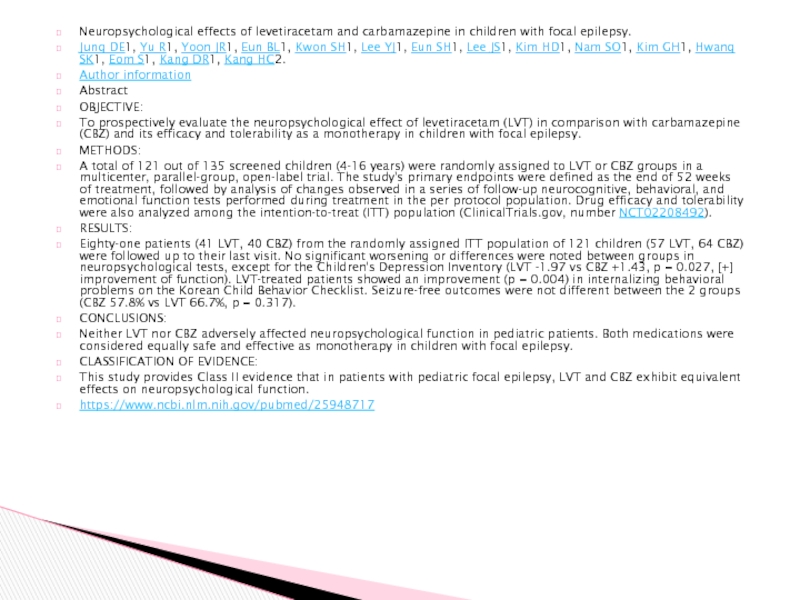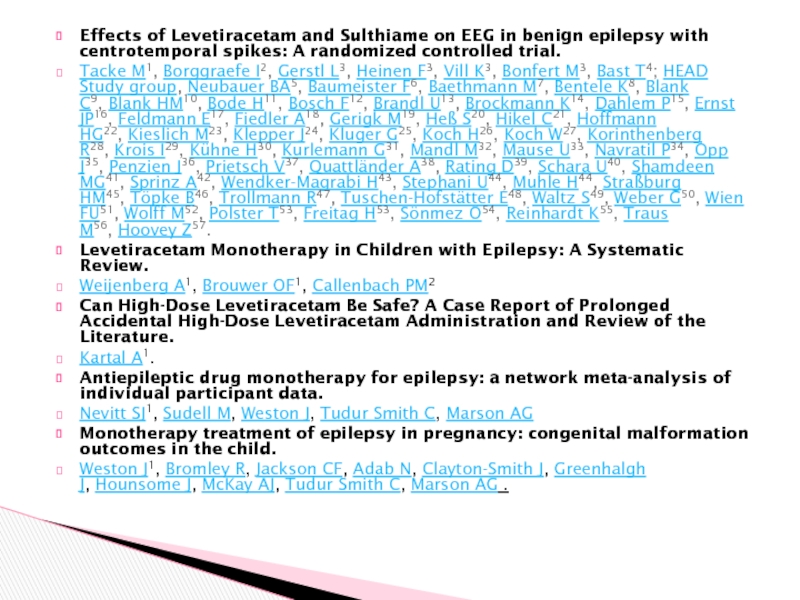Слайд 13Neuropsychological effects of levetiracetam and carbamazepine in children with focal epilepsy.
Jung DE1, Yu R1, Yoon JR1, Eun BL1, Kwon
SH1, Lee YJ1, Eun SH1, Lee JS1, Kim HD1, Nam SO1, Kim GH1, Hwang SK1, Eom S1, Kang DR1, Kang
HC2.
Author information
Abstract
OBJECTIVE:
To prospectively evaluate the neuropsychological effect of levetiracetam (LVT) in comparison with carbamazepine (CBZ) and its efficacy and tolerability as a monotherapy in children with focal epilepsy.
METHODS:
A total of 121 out of 135 screened children (4-16 years) were randomly assigned to LVT or CBZ groups in a multicenter, parallel-group, open-label trial. The study's primary endpoints were defined as the end of 52 weeks of treatment, followed by analysis of changes observed in a series of follow-up neurocognitive, behavioral, and emotional function tests performed during treatment in the per protocol population. Drug efficacy and tolerability were also analyzed among the intention-to-treat (ITT) population (ClinicalTrials.gov, number NCT02208492).
RESULTS:
Eighty-one patients (41 LVT, 40 CBZ) from the randomly assigned ITT population of 121 children (57 LVT, 64 CBZ) were followed up to their last visit. No significant worsening or differences were noted between groups in neuropsychological tests, except for the Children's Depression Inventory (LVT -1.97 vs CBZ +1.43, p = 0.027, [+] improvement of function). LVT-treated patients showed an improvement (p = 0.004) in internalizing behavioral problems on the Korean Child Behavior Checklist. Seizure-free outcomes were not different between the 2 groups (CBZ 57.8% vs LVT 66.7%, p = 0.317).
CONCLUSIONS:
Neither LVT nor CBZ adversely affected neuropsychological function in pediatric patients. Both medications were considered equally safe and effective as monotherapy in children with focal epilepsy.
CLASSIFICATION OF EVIDENCE:
This study provides Class II evidence that in patients with pediatric focal epilepsy, LVT and CBZ exhibit equivalent effects on neuropsychological function.
https://www.ncbi.nlm.nih.gov/pubmed/25948717

Слайд 17Effects of Levetiracetam and Sulthiame on EEG in benign epilepsy with centrotemporal
spikes: A randomized controlled trial.
Tacke M1, Borggraefe I2, Gerstl L3, Heinen F3, Vill K3, Bonfert
M3, Bast T4; HEAD Study group, Neubauer BA5, Baumeister F6, Baethmann M7, Bentele K8, Blank C9, Blank HM10, Bode H11, Bosch F12, Brandl U13, Brockmann K14, Dahlem P15, Ernst JP16, Feldmann E17, Fiedler A18, Gerigk M19, Heß S20, Hikel C21, Hoffmann HG22, Kieslich M23, Klepper J24, Kluger G25, Koch H26, Koch W27, Korinthenberg R28, Krois I29, Kühne H30, Kurlemann G31, Mandl M32, Mause U33, Navratil P34, Opp J35, Penzien J36, Prietsch V37, Quattländer A38, Rating D39, Schara U40, Shamdeen MG41, Sprinz A42, Wendker-Magrabi H43, Stephani U44, Muhle H44, Straßburg HM45, Töpke B46, Trollmann R47, Tuschen-Hofstätter E48, Waltz S49, Weber G50, Wien FU51, Wolff M52, Polster T53, Freitag H53, Sönmez Ö54, Reinhardt K55, Traus M56, Hoovey Z57.
Levetiracetam Monotherapy in Children with Epilepsy: A Systematic Review.
Weijenberg A1, Brouwer OF1, Callenbach PM2
Can High-Dose Levetiracetam Be Safe? A Case Report of Prolonged Accidental High-Dose Levetiracetam Administration and Review of the Literature.
Kartal A1.
Antiepileptic drug monotherapy for epilepsy: a network meta-analysis of individual participant data.
Nevitt SJ1, Sudell M, Weston J, Tudur Smith C, Marson AG
Monotherapy treatment of epilepsy in pregnancy: congenital malformation outcomes in the child.
Weston J1, Bromley R, Jackson CF, Adab N, Clayton-Smith J, Greenhalgh J, Hounsome J, McKay AJ, Tudur Smith C, Marson AG .
